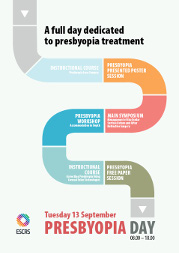Posters
Bilateral acute corneal decompensation after uneventful photorefractive keratectomy (PRK)
Poster Details
First Author: M. Garcia-Gonzalez SPAIN
Co Author(s): A. Rodero I. Rodriguez-Perez J. Gros-Otero J. Garcia-Perez
Abstract Details
Purpose:
To describe a case of bilateral acute corneal decompensation after uneventful photorefractive keratectomy (PRK).
Setting:
Clinica Novovision, Madrid, Spain. Clinica Rementeria, Madrid, Spain.
Methods:
A 35-year-old man had bilateral PRK with the adjuvant use of mitomycin C (MMC) for the correction of -5.75 diopters (D) in the right eye (RE) and -5.25D in the left eye (LE). Preoperative bilateral best-corrected visual acuity (BCVA) was 1.0. Preoperative central corneal thickness (CCT) was 520 microns in both eyes (BE). A 20% ethanol solution diluted in balanced salt solution was instilled inside a trephine and left for 40 seconds to create the epithelial flap. 0.02% MMC was applied for 30 seconds over the ablated stroma, with care taken to avoid leakage of the drug on the limbus.
Results:
On day 1, uncorrected visual acuity (UCVA) was 0.2 in BE. One week postoperatively, UCVA was 0.1 in BE and a bilateral pancorneal edema was observed. Despite the hourly instillation of topical corticosteroid, on day 10, UCVA decreased to counting fingers in BE with no improvement in the corneal edema. Systemic corticosteroids were then prescribed. Two weeks postoperatively, UCVA improved to 0.4 in the RE and 0.1 in the LE. One month postop, UCVA was 1.0 in BE. CCT decreased from 710/700 µm in the RE and LE respectively, at 1 week postop, to 457/446 µm at one month postop.
Conclusions:
Acute corneal decompensation is a very rare complication after uneventful PRK. Systemic and topical costicosteroids were useful in the complete resolution of the corneal edema.
Financial Disclosure:
NONE





